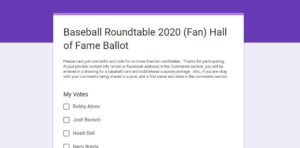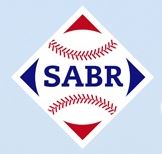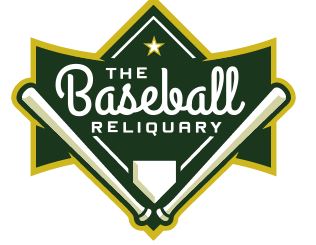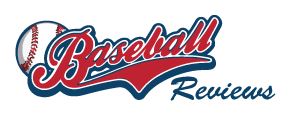BBRT’s Baseball Hall of Fame 2020 Debate Season is officially open! The Baseball Writers Association of America (BBWAA) 2020 Hall of Fame ballots were distributed early this week and the results will be announced in January, with the honorees inducted on July 21. This year’s traditional ballot includes 14 holdovers from last year, along with 18 newcomers.
In this post, BBRT will share:
- Predictions on the 2020 BBWAA voting;
- BBRT’s ballot (if I had one);
- A deep look into all the candidates on the ballot;
- A link to BBRT’s unofficial fan ballot – please take a few minutes to follow the link and cast your vote.
—PARTICIPATE IN BASEBALL ROUNDTABLE’S 2010 FANS’ HALL OF FAME BALLOT—
Baseball Roundtable is once again conducting an unofficial fan ballot – to cast your vote(s), click here or on the ballot image below. Remember, you can vote for up to ten of the nominees for 2020 induction. If you want to read through the nominees’ bios first, there is another link to the BBRT Fan Ballot following the bios (near the end of this post). BBRT will be providing updates on the fan balloting, as well as a post-election comparison of fan votes as compared to the final BBWAA results. Voting on the BBRT Fan Ballot will remain open until January 1, 2020.
Also, if you leave your email or Facebook address in the comments section at the end of the ballot, you will be entered in a bobblehead and baseball card “surprise-prize” drawing.
As we consider this year’s slate of candidates, BBRT would stress that all the players on the ballot – even those who remain for only one voting cycle – deserve recognition. To rise to the major leagues, last ten years and make it past the Hall of Fame Screening Committee is a significant accomplishment in itself. In fact, the ballot release is a highlight for BBRT, as it provides a chance to acknowledge the accomplishments of all the candidates – not just the favorites for election. For example, a review of the ballot gives us the opportunity to note that Orioles’ second basemen Brian Roberts – while he only played 100 or more games in seven of his fourteen MLB seasons – was a doubles machine and a threat on the bases when in the lineup on a regular basis. In his seven seasons of 100+ games, 2003-09, Roberts hit 300 doubles (topping 50 three times and leading the AL twice) and stole 235 bases (stealing 30 or more four times and leading the league with 50 steals in 2007). It also provides the opportunity to focus on such accomplishments as Alfonso Soriano’s 40-40 season (one of just four such campaigns in MLB history), Bobby Abreu’s 400 stolen bases and Jose Valverde’s three seasons leading his league in saves. You get the idea.
Now on to the official 2020 Baseball Hall of Fame election process itself – and, then, a look at the players on the ballot for 2020.
BASEBALL HALL OF FAME ELIGIBILITY/CRITERIA FOR ELECTION
The basic rules for eligibility are that a player must have played at least ten seasons and be retired for at least five years. In addition, the player must be approved for the ballot by the Hall of Fame Screening Committee.
A player can remain on the ballot for up to ten years, but must receive at least five percent of the vote in the preceding year’s ballot to remain on the ballot. Each voter can vote for up to ten candidates. Election requires that a player be named on at least 75 percent of the ballots cast.
The criteria for election: “Voting shall be based upon the player’s record, playing ability, integrity, sportsmanship, character, and contributions to the team(s) on which the player played.”
Now, let’s take a look at who BBRT predicts will be elected by the BBWAA; how BBRT would vote if I had a ballot; and, along the way, the bios of these year’c candidates.
—–LIKELY BASEBALL HALL OF FAME ELECTEES FOR 2019—–
BBRT’s Prediction for 2020 …
Last November, Baseball Roundtable released its 2020 BBWAA balloting predictions, projecting the election of Mariano Rivera and Edgar Martinez and listing Mike Mussina and Roy Halladay as “dark horse” candidates with a chance to generate the needed 75 percent support. All four were elected. Two years ago, BBRT predicted the election of Chipper Jones, Jim Thome, Vlad Guerrero and Trevor Hoffman (with Mike Mussina as a “dark horse” candidate). Jones, Thome, Guerrero and Hoffman made it, with Mussina garnering 64.5 percent (sixth most).
For 2020, BBRT anticipates just two electees from the traditional ballot:
- Derek Jeter
- Larry Walker
I also see one “dark horse” candidate who may slip in this season, but I have a hunch will fall closer to 70 percent than 75 percent.
- Curt Schilling
Note: For BBRT’s previously posted take on the 2020 Modern Game (Era Committee) Hall of Fame ballot, click here.
Let’s move on to BBRT’s hypothetical ballot and bios of the players I would vote for – followed by a look at the remainder of the 2020 candidates.
Side note: You will not find those caught up in the PED-controversy on my ballot. While I think the best of them will eventually be elected/inducted, if I had a ballot, I’d prefer they made the 75 percent without my vote. Still, given their place in the history of the game, I’d probably break down and vote for the top players in this group when they reached their final year of eligibility.
So, here is BBRT’s Hall of Fame Ballot – again, if I had one – with the players listed in BBRT’s order of preference.
GROUP ONE – BBRT WOULD VOTE FOR THESE TWO
AND ANTICIPATES THEY WILL BE IN THE 2019 HOF CLASS.
Derek Jeter – (Shortstop, 1995-2014) – First Year on the ballot.
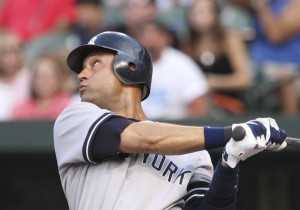 A career-long Yankee, Derek Jeter’s 3,465 base hits (for a .310 career average) rank sixth in baseball history. Who is ahead of him? Pete Rose, Ty Cobb, Hank Aaron, Stan Musial and Tris Speaker. That probably makes his case right there. But let’s look a little deeper.
A career-long Yankee, Derek Jeter’s 3,465 base hits (for a .310 career average) rank sixth in baseball history. Who is ahead of him? Pete Rose, Ty Cobb, Hank Aaron, Stan Musial and Tris Speaker. That probably makes his case right there. But let’s look a little deeper.
Jeter is a 14-time All Star, five-time Silver Slugger and five-time Gold Glover – as well as the 1996 American League Rookie of the Year.
Overall, Jeter hit .300 or better in 12 campaigns. While he only led the AL in hits twice, he topped 200 safeties in eight times (the final time with an AL-leading 216 hits in 2012; at age 38). Jeter also scored 1,923 runs (eleventh all time), topping 100 runs scored in 13 season and leading the AL with 127 in 1998. He collected 544 doubles (35th all time), 66 triples and 260 home runs – amassing 4,921 regular season total bases (23rd all time). A savvy base runner, Jeter also stole 358 bases, twenty or more in eight seasons, with a high of 34 in 2006.
Jeter also played in a record 158 post-season games, hitting .308 (200 hits), with 20 home runs, 61 RBI, 111 runs scored (post-season record) and 18 steals. He was the MVP of the 2009 World Series – and hit .321 in 38 Fall Classic games (seven World Series).
Derek Jeter’s Best Season: In 1999, Jeter hit a robust .349, with a league -leading 219 hits, 24 home runs, 102 RBI, 134 runs scored and 19 stolen bases.
This one’s a gimme – Jeter goes in. Will it be unanimous? I just have a hunch there will be a holdout or two.
——————
Larry Walker – (Outfield, 1989-2005) … Tenth (final) year on the ballot, 54.6 percent last year.
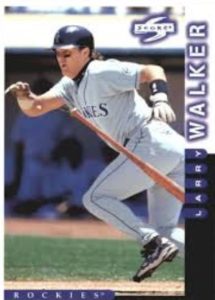 Larry Walker will need a big boost (players usually get somewhat of a boost in their final year of eligibility) to reach 75 percent I’ll go out on a limb here and predict he makes it; but it is no sure thing.
Larry Walker will need a big boost (players usually get somewhat of a boost in their final year of eligibility) to reach 75 percent I’ll go out on a limb here and predict he makes it; but it is no sure thing.
Walker played for the Expos (1989-1994), Rockies (1995-2004) and Cardinals (2004-2005). Given BBRT’s admiration for “lumber and leather,” Walker’s combination of three batting titles, three Silver Slugger Awards and seven Gold Gloves earns him my vote.
Walker played 17 MLB seasons and retired with 2,160 hits, a .313 average and three batting titles. Between 1997 and 2001, he hit .350 or better in four of five seasons. The five-time All Star (and 1997 NL MVP) hit 383 home runs (a high of 49 in 1997) and stole 230 bases (a high of 33 in 1997). Walker hit just .230 in 28 post-season games, but did rack up seven home runs, 15 RBI and sixteen walks in those contests.
Walker’s ten seasons in hitter-friendly Colorado may be hurting his vote totals – he hit .383 for his career in Coors, .271 elsewhere. Also reaching 2,500 hits or 400 home runs would have been an asset. Still, BBRT believes if you add his Gold Glove defense to his productive bat, you have a Hall of Famer. I’m also not much for punishing a player for taking full advantage of his home-field conditions. Walker did jump from 34.1 to 54.6 percent a year ago. So, he does have a chance chance of making it this year. I’d call it 50-50.
In 1997, Larry Walker led the NL with 409 total bases – the 18th highest single-season total all-time. (There have been only 29 seasons of 400 or more total bases in MLB history. Babe Ruth hold the record with 457 in 1921.).
Larry Walker’s Best Season: In his 1997 NL MVP year (Rockies), Walker hit .366, with a league-leading 49 home runs. He drove in 130 runs, scored 143, rapped 46 doubles, led the league in total bases at 409, topped the league in slugging percentage at .720 and even threw in 33 stolen bases and a Gold Glove. That’s using all five tools.
—————
A DARK HORSE CANDIDATE WHO WOULD NOT GET BBRT’S VOTE
Curt Schilling – (Starting Pitcher, 1988-2007) … Eighth year on the ballot, 60.9 percent last year.
Curt Schilling pitched for the Orioles (1988-1990), Astros (1991), Phillies (1992-2000), Diamondbacks (2000-2003) and Red Sox (2004-2007). Schilling was a six-time All Star, with 216 career wins (three seasons of 20 or more wins) over a 20-season MLB career. He recorded the 15th most career MLB strikeouts at 3,116 (three seasons of 300 or more whiffs), led his league in wins twice, complete games four times, innings pitched twice and strikeouts twice. He was also the 2001 World Series co-MVP – and has an impressive 11-2, 2.23 ERA post-season record (19 starts).
Curt Schilling is one-half of one of only two tandems of teammates to strike out 300 batters in the same season. In 2002, Schilling fanned 316 batters for the Diamondbacks, while teammate Randy Johnson whiffed 324. In 2019, Gerrit Cole (326) and Justin Verlander (300 K) joined this club.
He is on the cusp for the HOF – reaching 250 wins would have helped (although Jim Kaat, with 283 wins and 16 Gold Gloves is still not in the HOF – a Minnesota gripe here). However, Schilling’s outspoken views and the lack of a Cy Young Award may be working against his vote-getting capacity. I think Schilling will move up a few percentage points, but still fall short.
Curt Schilling’s Best Season: In 2001, Schilling went 22-6 for the Diamondbacks (with a 2.98 ERA). That year, he led the league in wins, starts (35), complete games (six), innings pitched (256 2/3).
FIVE PLAYERS WHO WOULD GET BBRT’S VOTE …
BUT ARE NOT LIKELY TO ENTER THE HOF IN 2020
Omar Vizquel – (Shortstop/Third Base, 1989-2012) – Third year on the ballot, 42.8 percent on 2019 ballot.
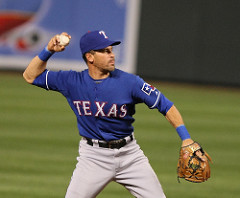
Photo by Keith Allison 
Omar Vizquel got off to a good start toward a HOF plaque, grabbing 37 percent support on his first-ballot year and moving up to 42.8 percent a year ago. Vizquel once again earns BBRT’s vote – and should make his way into the Hall of Fame over time. When he does, it will be more with his glove (eleven Gold Gloves) than his bat. However, voters should be mindful of the fact that he finished his 24-season MLB career just 123 hits short of that milestone 3,000 safeties.
Vizquel delivered premier defense to the Mariners (1989-1993), Indians (1994-2004), Giants (2005-2008), Rangers (2009), White Sox (2010-2011) and Blue Jays (2012). He was a three-time All Star – and put together a string of nine straight Gold Gloves at shortstop (1993-2001).
Omar Vizquel led his league in sacrifice bunts four times.
In the field, Vizquel has the highest career fielding percentage (.9847) among shortstops with at least 500 games at the position. Vizquel is also the all-time leader among shortstops in double plays (1,734, 144 ahead of Ozzie Smith in second place), ranks third at the position for career assists and 11th in putouts. He shares the record (with Cal Ripken, Jr.) for the fewest errors by a shortstop in a season of at least 150 games played (three).
On offense, Vizquel put up a serviceable .272 career average, with 80 home runs, 951 RBI and 1,445 runs scored. The 1,445 runs put him in the top 100 players all-time (82nd); while his 2,877 hits put him in the top 50 (43rd). He also swiped 404 bases – topping twenty steals eight times (a high of 42 in 1999) – putting him at number 72 on the all-time list. Vizquel played in 57 post-season games, hitting .250-0-20.
Omar Vizquel’s Best Season: In 1999, with the Indians, Vizquel hit a surprising .333, with five home runs, 66 RBI, 112 runs scored and 42 stolen bases – and, of course, won a Gold Glove at shortstop.
Vizquel would get BBRT’s vote, but the BBWAA voters likely will make him wait a bit longer – showing a preference for a bit more offense.
—————-
Jeff Kent – (Second Base/Third Base/First Base, 1992-2008) … Seventh year on the ballot, 18.1 percent last year.
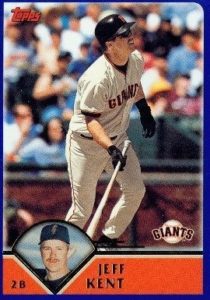 BBRT believes Jeff Kent is a deserving candidate, but he has not been getting much support from the writers. Kent holds the all-time MLB record for home runs by a second baseman (351 of his 377 career round trippers were hit while in the lineup at second base). He has a healthy .290 career batting average; his 1,518 RBI are 54th all time; and his 560 doubles 30th.
BBRT believes Jeff Kent is a deserving candidate, but he has not been getting much support from the writers. Kent holds the all-time MLB record for home runs by a second baseman (351 of his 377 career round trippers were hit while in the lineup at second base). He has a healthy .290 career batting average; his 1,518 RBI are 54th all time; and his 560 doubles 30th.
Kent was a five-time All Star and the 2000 NL MVP. As primarily a middle infielder, he hit 20 or more home runs in 12 seasons (a high of 37 in 2007) and topped 100 RBI eight times. He hit .276, with nine home runs and 23 RBI in 49 post-season games.
Jeff Kent has more career runs batted in than such noted Hall of Famers as Mickey Mantle, Billy Williams, Eddie Mathews, Duke Snider and Orlando Cepeda.
Kent has the credentials, but BBRT has a hunch the writers may keep him on the bench – a couple of Gold Gloves, at this traditionally defense-oriented position, would have really helped his case. Kent played for the Blue Jays (1992), Mets (1992-1996), Indians (1996), Giants (1997-2002), Astros (2003-2004) and Dodgers (2005-2008).
Jeff Kent’s Best Season: With the Giants in 2000, Kent put up these stats – 159 games; 196 hits; .334 average; 33 home runs; 125 RBI; 114 runs; 12 steals. His performance earned him the NL MVP Award.
Kent gets BBRT’s vote – and I believe the BBWAA’s support is overdue (but not forthcoming). This is one HOF “snub” that somewhat confuses BBRT.
—————
Todd Helton – (First Base, 1997-2013) … Second year on the ballot, 16.5 percent last year.
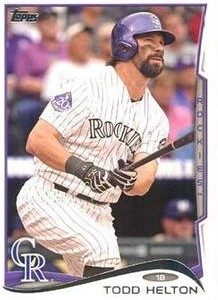 Todd Helton picked up just 16.5 percent of the vote in his first year on the ballot – probably due to a strong ballot and the fact that he spent his entire 17-year career with the Rockies (playing half his games in hitter-friendly Coors field). Helton, who put up a .316 career average, hit .345 at home and .287 on the road. Despite that home/road split, Helton’s body of work deserves HOF consideration. He was a five-time All Star, three-time Gold Glover and four-time Silver Slugger. He hit over .300 in 12 seasons – and won the NL batting crown in 2000 with a .372 average. His 59 doubles that season are the sixth-most all-time. Helton drove in 100 or more runs in five seasons and scored in triple figures six times. His 1,335 walks (36th all-time) indicate the respect he earned at the plate. Helton also ranks fifth in games played at first base, second in career assists at the position, 13th in putouts and third in double plays.
Todd Helton picked up just 16.5 percent of the vote in his first year on the ballot – probably due to a strong ballot and the fact that he spent his entire 17-year career with the Rockies (playing half his games in hitter-friendly Coors field). Helton, who put up a .316 career average, hit .345 at home and .287 on the road. Despite that home/road split, Helton’s body of work deserves HOF consideration. He was a five-time All Star, three-time Gold Glover and four-time Silver Slugger. He hit over .300 in 12 seasons – and won the NL batting crown in 2000 with a .372 average. His 59 doubles that season are the sixth-most all-time. Helton drove in 100 or more runs in five seasons and scored in triple figures six times. His 1,335 walks (36th all-time) indicate the respect he earned at the plate. Helton also ranks fifth in games played at first base, second in career assists at the position, 13th in putouts and third in double plays.
Todd Helton is one of only 18 players to reach 400 or more total bases in a season – and one of only seven players to have multiple 400+ total base campaigns. He is also the only player to collect 100 extra-base hits in two consecutive seasons (2000-2001).
Todd Helton’s Best Season: In 2000, Helton won the NL batting crown with a .372 average – and also led the league in base hits (216), doubles (59), RBI (147), on-base percentage (.463), slugging percentage (.698) and total bases (405). He also scored 138 runs and hit 42 home runs.
Helton will stay on the ballot and has a chance at entry into the HOF – he’s just not likely to overcome the Coors Field-bias in the short-term future.
—————-
Billy Wagner – (LHP 1995-2010) … Fifth year on the ballot, 5.6 percent last year.
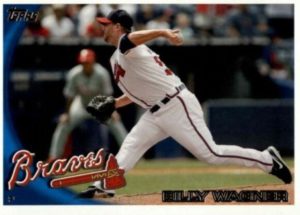 Billy Wagner played for the Astros (1995-2003), Phillies (2004-2005), Mets (2006-2009), Red Sox (2009) and Braves (2010). Wagner was a seven-time All Star, who amassed 422 saves (sixth all-time) in a 16-season MLB career. He had nine seasons of 30 or more saves; a career ERA of 2.31; 1,196 career strikeouts in 903 innings; and 47-40 won-lost record.
Billy Wagner played for the Astros (1995-2003), Phillies (2004-2005), Mets (2006-2009), Red Sox (2009) and Braves (2010). Wagner was a seven-time All Star, who amassed 422 saves (sixth all-time) in a 16-season MLB career. He had nine seasons of 30 or more saves; a career ERA of 2.31; 1,196 career strikeouts in 903 innings; and 47-40 won-lost record.
Billy Wagner’s Best Season: In 2003, Wagner went 1-4, 1.78 for the Astros, saving 44 games and fanning 105 batters in 86 innings.
BBWAA voters have been very demanding of relievers (although the recent induction of Mariano Rivera and Trevor Hoffman may be a good sign – but they, of course, both had 600+ saves.) BBRT thinks Wagner belongs in the Hall (based on his 400+ saves) – and hopes that momentum starts to build. (However, the odds are not in Wagner’s favor; he is drifting awfully close to that 5 percent mark.)
—————-
Andy Pettitte – (LHP/Starter, 1995-2010, 2012-13) … Second year on the ballot. 9.9 percent last year.
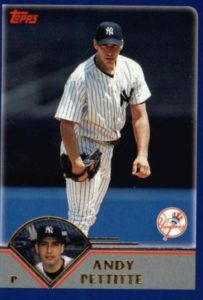 I had to think for a while on this one (and will probably get some push back from readers), largely because a major part of Andy Pettitte’s HOF resume was achieved in the post-season. Pettitte holds the MLB post-season marks for most wins (19 … versus 11 losses), innings pitched (276 2/3), games started (44) and is second in strikeouts (183). His post-season accomplishments include a 3.81 career ERA and the 2001 American League Championship series MVP Award.
I had to think for a while on this one (and will probably get some push back from readers), largely because a major part of Andy Pettitte’s HOF resume was achieved in the post-season. Pettitte holds the MLB post-season marks for most wins (19 … versus 11 losses), innings pitched (276 2/3), games started (44) and is second in strikeouts (183). His post-season accomplishments include a 3.81 career ERA and the 2001 American League Championship series MVP Award.
Pettitte was no slouch in the regular season (Yankees – 1995-2003, 2007-2010, 2012-13) and Astros (2004-06). He finished with 256 wins (153 losses) and a 3.85 ERA. Pettitte won 20 games in two seasons and 14 or more games 12 times – leading the AL with 21 wins in 1996. The three-time All Star struck out 2,448 batters (45th all-time) in 2,316 innings.
Andy Pettitte started 30 or more games in a season 12 times, leading his league three times (1997, 2006, 2007.)
Pettitte’s post-season numbers, plus 256 regular-season victories and the fact that he had 100+ more career wins than losses secures BBRT’s vote. He still has a long ways to go with the BBWAA voters, however.
Andy Pettitte’s Best Season: In 1997, following a 21-8 campaign in 1996, Pettitte went 18-7, with a 2.88 ERA (fourth-best in the AL), leading the league in starts with 35, finishing third in innings pitched (240 1/3) and eighth in strikeouts (166).
Post-publication note: One of BBRT’s readers has correctly informed me that Pettitte was a PED-user. I found he admitted to briefly using HGH while in recovery from and elbow injury – a couple of years before it was banned. Pettitte was forthcoming, accepting of responsibility and apologetic. Given the circumstances, I’ll stand by this vote (but also continued to “dig” a bit). I thought, in the name of transparency, I should add this information here.
—————
TWO PLAYERS WHO WERE VERY CLOSE CALLS …
BUT WOULD GET BBRT’S VOTE (to keep them on the ballot for next year)
Alfonso Soriano – (2B/OF, 1999-2014) … First year on the ballot.
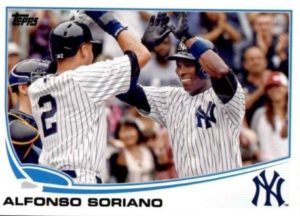 Had Alfonso Soriano spent his career as a second baseman (he was moved to the outfield in his eighth season – sixth full season), his path to the Hall of Fame might have been assured. Consider that in five full seasons at the keystone sack (2001-2005), Soriano hit .282, with 159 home runs 461 RBI and 167 stolen bases. I’ll do the math for you. That’s an average campaign of .282, 31.8 home runs, 92.2 RBI and 33.5 steals. Those are HOF numbers for a middle infielder. (Of course, it’s also likely that, had he stayed at 2B, he would have put up some pretty impressive numbers for errors. Soriano led AL second sackers in errors in all five of his full seasons at the position.)
Had Alfonso Soriano spent his career as a second baseman (he was moved to the outfield in his eighth season – sixth full season), his path to the Hall of Fame might have been assured. Consider that in five full seasons at the keystone sack (2001-2005), Soriano hit .282, with 159 home runs 461 RBI and 167 stolen bases. I’ll do the math for you. That’s an average campaign of .282, 31.8 home runs, 92.2 RBI and 33.5 steals. Those are HOF numbers for a middle infielder. (Of course, it’s also likely that, had he stayed at 2B, he would have put up some pretty impressive numbers for errors. Soriano led AL second sackers in errors in all five of his full seasons at the position.)
Having spent a little more than half of his career in the OF (starting 849 games in the OF and 734 at 2B), Soriano has stiffer competition for a spot in the HOF. Still, BBRT thinks he deserves to qualify for next year’s ballot.
Soriano was a seven-time All Star (four at 2B, three in the OF) and four-time Silver Slugger. He also is one of only four members of the 40-40 Club (forty home runs and forty stolen bases in the same season). In 2006, Soriano hit .277, with 46 home runs and 41 stolen bases. The only other players to record 40-40 seasons are Barry Bonds, Alex Rodriguez and Jose Canseco. Soriano also logged three 30-30 seasons. Overall, he hit 30 or more home runs seven times and stole 30 or more bases five times (leading the AL with 41 in 2002). He also scored 100+ runs in four campaigns and drove in 100+ tallies in four seasons.
Soriano finished with 2,095 career hits (.270 average), 1,159 RBI and 1,152 runs scored. His 412 career home runs are 54th all time and his 924 extra-base hits are 59th. He is one of those “on the cusp” Hall of Famers in BBRT’s view – and will have to build some momentum. Again, BBRT believes he deserves to stay on the ballot.
Soriano played for the Yankees (1999-2003, 2013-14)), Rangers (2004-2005), Nationals (2006) and Cubs (2017-13).
Alfonso Soriano’s Best Season: In 2002 (Yankees), Soriano hit an even .300, leading the AL in hits (209), runs (128) and steals (41). He also hit 51 double and 39 home runs, while driving in 102.
—————–
Bobby Abreu – (OF, 1996-2012, 2014) … First year on the ballot.
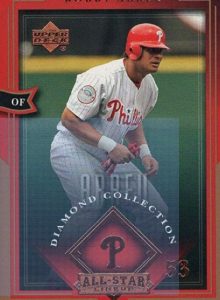 Bobby Abreu played in 18 MLB seasons. The two-time All Star showed both power and speed, hitting 288 home runs and swiping 400 bases (74th all time). Abreu led his league in games played twice, doubles once (50 in 2002) and triples once. He won a Gold Glove in 2005.
Bobby Abreu played in 18 MLB seasons. The two-time All Star showed both power and speed, hitting 288 home runs and swiping 400 bases (74th all time). Abreu led his league in games played twice, doubles once (50 in 2002) and triples once. He won a Gold Glove in 2005.
A solid .291 career hitter (2,470 base hits), Abreu hit .300 or better in six seasons. He hit 20 or more round trippers in 10 campaigns, stole 20 or more bases 12 times (a high of 40 in 2004), drove in 100 or more runs eight times and scored at least 100 runs eight times. Abreu also walked 1,476 times – including 100 or more free passes in eight straight seasons (1999-2006).
Bobby Abreu’s 1,476 walks are 20th all-time and his 574 double are 25th.
Abreu played for the Astros (1996-97, Phillies (1999-2006), Yankees (2006-2008), Angels (2009-1012), Dodgers (2012) and Mets (2014).
In 20 post-season games, Abreu went 19-for-67 (.284), with one home runs and nine RBI.
Bobby Abreu’s Best Season: In 2004, as a Phillie, Abreu hit .301, with 30 home runs and forty steals. An All Star that season, he also drove in 105 runs and scored 118.
Abreu’s 400 steals are an HOF plus. Had he reached 300 home runs, it would have really boosted his prospects. I’d like to see Abreu stay on the ballot.
——————————THE REST OF THE BALLOT————————————
So, with BBRT’s unofficial ballot covered, let’s look at the remainder of candidates – in alphabetical order. Note: Here you will find a host of players with solid (but perhaps not HOF-level) career numbers and accomplishments.
Josh Beckett – RHP, 2001-2014) … First year on the ballot.
Josh Beckett put up a 138-106, 3.38 record in 14 MLB seasons. The three-time all Star led the AL with 20 wins (seven losses) for the Red Sox in 2007, when he finished second in the Cy Young Award voting to C.C. Sabathia (21-7, 2.18). Beckett won 15 or more games in four seasons and fanned 150 or more batters in 11 seasons (a high of 199 in 2009).
Josh Beckett was a horse in the postseason, going 7-3, 3.07, striking out 99 batters in 93 2/3 innings and throwing three complete games in 14 appearances (13 starts).
Josh Beckett pitched a no-hitter in his final MLB season. On May 25, pitching for the Dodgers, he no-hit the Phillies in a 6-0 win – walking three and fanning six.
Josh Becket played for the Marlins (2001-2005), Red Sox (2006-2012) and Dodgers (2012-2014).
Josh Beckett’s Best Season: In 2007, Becket let the AL with 20 wins (seven losses), his 3.27 earned run average was sixth in the AL, and his 194 strike outs (in 200 2/3 innings) seventh. That season, he pitched in four post-season games for Boston – going 4-0, 1.20. He was the MVP of the American League Championship Series, when he started and won two games – giving up nine hits and just three earned runs, while fanning 18 in 14 innings.
Beckett had a solid MLB career, but falling short of 150 wins and never reaching 200 strikeouts in a season dims his HOF chances. I really like his post-season accomplishments, however.
—————
Heath Bell – (RHP, 2005-14) … First year on the ballot.
Heath Bell appeared in 590 MLB games – all in relief. The three-time All Star was truly a dominant closer for the Padres from 2009-11, making the All Star team and saving 40 or more games in each of those three campaigns – and being named NL Reliever of the Year in 2009 and 2010. In 2009, he led the NL with 42 saves. Over his 11-season MLB career, Bell was 38-32, 3.49, with 168 saves. He averaged better than a strikeout per inning – fanning 637 batters in 628 2/3 innings.
Heath Bell’s Best Season: In 2010, Bell went 6-1, with 47 saves. He pitched to a 1.93 earned run average in 70 innings (67 appearance), fanning 86 batters.
————–
Barry Bonds – (Outfield, 1986-2007) … Eighth year on the ballot, 59.1 percent a year ago.
Barry Bonds played for the Pirates (1986-1992) and the Giants (1993-2007). There is no doubt about Bond’s credentials – .298 average, 2,935 hits, MLB-record 762 home runs, 1,996 RBI, MLB-record 2,558 walks. He was also a 14-time All Star; 12-time Silver Slugger Award winner; his league’s MVP a record seven times; and an eight-time Gold Glove winner. In 2001, Bonds hit .328, with an MLB-record 73 home runs and 177 RBI. He drove in 100 or more runs 12 times and also scored 100 or more runs in a dozen seasons. And, I could go on and on.
Barry Bonds drew an MLB-record 688 intentional walks in his career. Second place? Albert Pujols, with 311. In 2004 alone, Bonds drew a record 120 intentional passes. He led his league in IBB 12 times.
Still, there are those PED’s – an elephant in the room (and on the ballot) that I think will keep Bonds out of the Hall for at least another year (and probably until his final year on the ballot). Eventually, the dam will break and we will see some of the major stars now under a PED cloud take places in the Hall. BBRT is not ready to cast that vote yet – and I don’t think 75 percent of the BBWAA is either. We can expect Bonds back on the ballot next year (he may top 60 percent this year).
Barry Bonds’ Best Season: In 2001, Bonds crushed an all-time record 73 home runs, while hitting .328, driving in 137 runs, scoring 129 – all while drawing 177 walks.
————–
Eric Chavez – (3B, 1998-2014) …. First year on the ballot.
BBRT has a soft spot for player who evidence “leather and lumber” – and that would include Eric Chavez, who won six Gold Gloves (consecutively, 2001-2006) and popped 260 home runs during his 17 MLB seasons.
As a defender, Chavez led AL third basemen in assists three times; putouts twice; double plays twice; and fielding percentage twice.
At the plate, Chavez hit .268 (1,477 career hits), with 260 home runs, 902 RBI. He topped 25 home runs six times (a high of 34 in 2002) and 100 RBI four times (a high of 114 in 2001).
Eric Chavez’ Best Season: In 2001, Chavez hit .288, with 32 home runs, 114 RBI, 91 runs scored and eight stolen bases – and picked up his first Gold Glove.
Chavez was a superior defender, with had solid (but not HOF) offensive numbers.
————–
Roger Clemens – (RHP/Starter, 1984-2007) … Eighth year on the ballot, 59.5 percent last year.
Roger Clemens pitched for the Red Sox (1984-1996), Blue Jays (1997-1998), Yankees (1999-2003, 2007) and Astros (2004-2006). Clemens has Hall-worthy stats: 354 wins (ninth all-time), 4,672 strikeouts (third all-time), an MLB-record seven Cy Young Awards and the 1986 AL MVP Award. The eleven-time All Star was a five-time 20-game winner (led the league in wins four times), seven-time ERA leader, five-time league leader in strikeouts, and six-time leader in shutouts. He won the AL pitching Triple Crown (Wins/ERA/Strikeouts) three times. Clemens also has 12 post-season wins, with 173 strikeouts in 199 post-season innings.
Roger Clemens shares the record for strikeouts in a nine-inning game (20) with Kerry Wood and Max Scherzer. Clemens is the only pitcher to achieve 20 whiffs in a nine-inning game twice.
Roger Clemens’ Best Season: Lots to choose from here. Like 21-6, 1.93 in 1990 – or 1987, with a 20-9 record, 2.97 ERA, 18 complete games and seven shutouts. I take 1986. Clemens went 24-4. 2.48 and won both the Cy Young (his first) and AL MVP Awards for the Red Sox. He led the AL in wins, winning percentage (.857) and earned run average. He was fifth in innings pitched (254) and second in strikeouts (238).
Yes, he’s got the numbers (those listed and more), but the PED controversy seems to stand between him and the Hall. Don’t think the BBWAA is ready yet, but he’ll continue on the ballot – and will likely gain a bit of ground on that 75 percent requirement.
————–
Adam Dunn – (OF-1B, 2001-2014) … First year on the ballot.
Adm Dunn had a great power swing – putting 462 balls (37th all time) out of the park in his 14 MLB seasons – at one point, (2004-2008), hitting at least forty long balls in five straight seasons. Then, of course, there is the other side of the coin. The two-time All Star also struck out 2,379 times (third all time), leading the league in whiffs in four seasons. Over his career, Dunn hit forty or more homers in six seasons and 30 or more in three more.
Adam Dunn is one of only 12 MLB players to have six or more 40-HR season.
Adam Dunn’s Best Season: In 2004, for the White Sox, Dunn hit .266, with 46 home runs, 102 RBI and 105 runs scored.
Four-hundred-plus home runs is a good start, but Dunn’s .237 career average ad 2,000+ strikeouts work against him.
—————
Chone Figgins (3B/OF/2B, 2002-12, 2014) …. First year on the ballot.
Chone Figgins (almost got my vote just for the name) played for the Angels (2002-2009), Mariners (2010-1012) and Dodgers (2014). He hit for a .276 average, with 35 home runs, 403 RBI and 341 stolen bases in 1,282 games. Figgins stole 30 or more bases in seven season – forty or more in five of those.
Chone Figgins’ Beat Season: In 2005, for the Angels, Chone Figgins hit .290, with a career-high and league-leading 62 stolen bases. He also had 25 doubles, ten triples and eight home runs – scoring 113 times and driving in 57 runs.
————–
Rafael Furcal … (SS, 2000-2012, 2014) …. First year on the ballot.
Rafael Furcal, who came up with the Braves, was the 2000 NL Rookie of the year, when he hit .294, scored 87 runs and stole 40 bases in 131 games. In his career, the three-time All Star hit a respectable .282 (1,817 hits), scored 1,063 runs (reaching 100 or more runs scored four times), hit 113 home runs, drove in 587 and stole 314 bases (stealing 25 or more bases seven times). On defense. Furcal led NL shortstops in assists twice, putouts twice and double plays once.
Furcal played for the Braves (2000-05), Dodgers (2006-11), Cardinals (2011-12) and Marlins (2014).
Rafael Furcal’s Best Season: In 2006, with the Dodgers, Rafael Furcal hit .300, with 15 home runs, 63 RBI, 113 runs scored and 37 stolen bases. He also led the NL in put outs and double plays at shortstop and was second in assists.
—————
Jason Giambi – (1B/OF/DH, 1995-2014) … First year on the ballot.
Jason Giambi’s 20-year MLB career is a tribute to his offensive production – a .277 average to go with 440 home runs and 1,441 RBI. Giambi was a five-time All Star, two-time Silver Slugger and the 2000 AL MVP. In the four seasons from 1999-2001, Giambi was clearly on top of his game (and on top of the plate), hitting .326, with 155 home runs and 502 RBI. While he did strike out 1,572 times, he also walked 1,366 times – contributing to a healthy .399 career on-base percentage. Giambi led the AL in OBP three times).
Jason Giambi led the AL in free passes in four seasons – in strike outs just once.
In his career, Giambi topped 25 home runs in nine seasons (40+ twice), 100 RBI in seven seasons (a high of 137 in 2000) and hit over .300 in four campaigns.
Giambi’s career can really be divided into two parts. Over his first ten seasons, he went .297-381-944, as compared to .238-159-497 over his final ten campaigns.
Jason Giambi played for the A’s (1995-2001, 2009), Yankees (2002-2008), Rockies (2009-12) and Indians (2013-14).
In 45 post-season games, Giambi hit .290, with seven long balls and 19 RBI.
Jason Giambi’s Best Season: In his 2000 MVP season (for the A’s), Giambi hit .333, with 43 home runs, 137 RBI, 108 runs scored and a league-topping 137 walks (versus 96 strikeouts). Notably, he put up similar numbers the very next season – .342-38-120, with a league-leading 129 walks.
Giambi is competing at a power-position – still his power numbers and on-base percentage may keep him on the ballot for 2012.
—————
Raul Ibanez – OF/1B, 1996-2014 … First year on the ballot.
Raul Ibanez enjoyed a 20-season MLB career – suiting up from age 24 to age 42. He hit a respectable .272 (2,034 base hits) over that time, with 305 home runs, 424 doubles, 1, 207 RBI and 1,055 runs scored. He also played solid defense, leading his league’s left fielders in assists and fielding percentage twice each and putouts once.
Ibanez was a one -time all Star (2009 Phillies). He hit 20 or more home runs in eight seasons, with a high of 34 in 2009. He also drove n 100+ runs in four campaigns and scored 100+ runs in one season.
Ibanez hit .245, with six home runs and 22 RBI in 44 post-season games.
Raul Ibanez’ Best Season: In 2006, with the Mariners, Ibanez hit .289, knocked 33 home runs, drove in 123 tallies and scored 103 times.
————–
Andruw Jones – (OF, 1996 -2012) … Third year on the ballot, 7.5 percent last year.
Andruw Jones played for the Braves (1996-2007), Dodgers (2008), Rangers (2009), White Sox (2010) and Yankees (2011-2012). In a 17-season career – primarily patrolling centerfield – he won ten Gold Gloves (consecutively, 1998-2007). At the plate, he hit .254, with 434 home runs (47th all time), 1,289 RBI and 1,204 runs scored. He topped 25 home runs in ten seasons (six over thirty and a league-leading and career-high of 51 in 2005). He scored 100 or more runs four times, drove in 100+ five times and stole twenty or more bases in a season four times.
Jones appeared in 76 post-season games, hitting .273, with ten home runs and 34 RBI.
In the 1996 World Series, Andruw Jones – just 19-years-old – hit .400 (8-for-20) with two home runs and six RBI, becoming the youngest player to hit for the distance in the Fall Classic.
Andrew Jones’ Best Season: In 2005, Jones hit only .263, but led the NL in home runs (51) and RBI (128) – finishing second in the MVP voting to Albert Pujols (.330-41-117).
Jones’ ten Gold Gloves work in his favor, but – over the long haul – that .254 average (he only hit .300 or better once and over .270 only four times) will dampen his HOF chances. Still, BBRT believe he deserves more support (he’s perilously close to the five percent mark).
—————
Paul Konerko – (1B, 1997-2014) … First year on the ballot.
Paul Konerko spent 16 of his 18 MLB seasons as a big bat in the middle of the White Sox lineup. A six-time All Star, Konerko hit .279 (2,340 hits), with 439 home runs (44th all time), 1,412 RBI and 1,162 runs scored. Konerko hit 30 or more home runs in seven seasons (40 or more twice), drove in at least 100 runs in four seasons and hit .300 or better four times.
He was the MVP of the 2005 AL Championship Series, when he drove in seven runs in five games. In 197 post-season contests, he hit .243, with seven home runs and 17 RBI,
Konerko played for the Dodgers (1997-98), Reds (1998) and White Sox 1999-2014.
Paul Konerko’s Best Season: In 2010, for the White Sox, Konerko his .312, with 39 home runs and 111 RBI.
Like Jason Giambi, his power output gives him a chance to stay on the ballot (listen up, Chicago-area BBWAA members); but long-run, both look to fall short of the HOF.
—————-
Cliff Lee – LHP, 2002-2014) … First year on the ballot.
Cliff Lee won 143 games (91 losses) in 13 MLB seasons, while putting up a 3.52 earned run average. He was a four-time All Star and the 2008 American League Cy Young Award winner. Over his career, he led his league in wins, earned run average and complete game once each and shutouts and innings pitched twice each. He also led the NL in strikeouts-to-walks ratio three times and finished in the top ten in his league in the category in six seasons. In addition, between 2008 and 2012, he allowed his league’s fewest walks per nine farms four times, was second once and fourth once.
In 328 games (324 starts), Lee notched 29 complete games and 12 shutouts, He pitched 2,156 2/3 innings, fanning 1, 824 batters.
Lee was solid in the post-season, going 7-3, 2.52 in 11 starts (three complete games).
Lee pitched for the Indians (2002-09), Phillies (2009, 2011-14), Mariners (2010) and Rangers (2010).
Cliff Lee’s Best Season: In his 2008 Cy Young Award season (Indians), Cliff Lee led the AL in wins (22, with just three losses); winning percentage (.880); earned run average (2.54); and shutouts (2). He fanned 170 batters in 223 1/3 innings, walking just 34 (a league-low 1.37 walks per nine innings).
—————
Carlos Pena – (1B, 2001-14) … First year on the ballot.
Carlos Pena hit 286 round trippers in his 14 MLB seasons. He collected 1,146 hits (for a .232 career average), drove in 818 runs; and scored 745 times. He hit 30 or more home runs in a season three times, leading the AL with 39 in 2009 (his career-high was 46 in 2007). The one-time All Star was also a one-time Gold Glover. Pena hit .269, with four home runs and 14 RBI in 19 post season games.
Although Carlos Pena played only 40 of his 1,493 games with the Rangers, he played his first (September 5, 2001) and last (July 12, 2014) MLB games in a Rangers’ uniform.
Pena played for the Rangers (2001. 2014), A’s (2002), Tigers (2002-2005), Red Sox (2006), Rays (2007-2010, 2012), Cubs (2011), Astros (2013) and Royals (2013).
Carlos Pena’s Best Season: In 2007, for Tampa Bay, Pena raked at a .282 pace, popping 46 home runs and driving in 121 tallies (all career highs).
—————
Brad Penny – (RHP, 2000-2012, 2014) … First year on the ballot.
Primarily a starting pitcher (349 MLB games, 319 starts), Brad Penny went 121-101, 4.29 over 14 MLB seasons. Penny was a two-time All Star and led the NL in wins (for the Dodgers) with 16 (nine losses) in 2006. Penny won at least 15 games in just two seasons (16 each in 2007 and 2007, his two All Star campaigns.) In nine post-season appearances, he went 3-2, 7.66.
Penny pitched for the Marlins (2000-2004), Dodgers (2004-2008), Red Sox (2009), Giants (2009, 2012), Cardinals (2010), Tigers (2011) and Marlins (2014).
Brad Penny’s Best Season: As a Dodger in 2007, Brad Penny went 16-4, leading the NL in winning percentage (.800), finishing fifth in wins and third in earned run average (3.03).
—————
J.J. Putz – RHP, 2003-2014) … First year on the ballot.
J.J. Putz made 572 relief appearance in his 14 MLB seasons, notching 37 wins (33 losses) and 189 saves, while putting up a 3.08 earned run average. The one-time All Star and 2007 Reliever of the Year saved 30 or more games four times, including a high of 45 for the 2011 Diamondbacks.
J.J. Putz’ Best Season: In 2007, Putz appeared in 68 games for the Mariners, going 6-1, 1.38 with 40 saves. In 71 2/3 innings, he fanned 82 batters and walked just 13.
—————
Manny Ramirez – (Outfield, 1993-2011) – Fourth year on the ballot, 22.8 percent last year.
Manny Ramirez played 19 MLB seasons, collecting 2,574 hits, a .312 batting average, 555 home runs (15th all-time) and 1,831 RBI (19th all-time). Ramirez was a 12-time All Star and led the AL in average (2002), home runs (2004) and RBI (1999) once each. Ramirez won nine Silver Slugger Awards, including eight consecutive (1999-2006), hit .285 with 29 home runs in 111 post-season games and was the 2004 World Series MVP. He hit 30 or more home runs in twelve seasons (five of 40+), scored 100 or more runs six times, hit .300 or better in 11 seasons and topped 100 RBI 12 times.
Manny Ramirez’ 29 post-season home runs are first all-time, while his 78 post-season RBI rank second. In addition, he is the all-time post-season leader in walks (72), and ranks third in post-season hits (117) and runs scored (67).
In 111 post-season games, Ramirez hit .285, with 29 home runs and 78 RBI.
Ramirez clearly put up HOF-caliber numbers, but two PED-related suspensions continue to hurt his chances. Not this year, but he’ll be back for another shot. Ramirez played for the Indians (1993-2000), Red Sox (2001-2008), Dodgers 2009-2010) and Rays (2011).
Manny Ramirez’ Best Season: In 1999, with Cleveland, Ramirez hit .333, with 44 home runs and 165 RBI (14th most in a season all-time) in 140 games.
—————-
Brian Roberts – (2B/SS, 2001-14) …. First year on the ballot.
Brian Roberts was a two-tine All Star, who spent 13 of his 14 MLB season with the Orioles. Although he played more than 100 games in only seven seasons, he was a doubles machine, banging out 367 two-baggers – hitting 50 or more doubles in three seasons (leading the AL twice). The speed that enabled Roberts to deliver all those doubles also contributed to his 285 stolen bases. He stole 20+ bases seven times, leading the AL with a career-high 50 steals in 2007 (being caught just seven times ).
Roberts hit .276 over his MLB career (1,527 hits), with 97 home runs, 542 RBI and 850 runs scored. He scored 100+ runs in four campaigns.
Brian Roberts’ Best Season: in 2005, Brian Roberts hit .314, with 18 home runs and 73 RBI. He also scored 92 runs, stole 45 bases in 52 attempts, and knocked 45 doubles and seven triples. That season, he finished second in the AL among second basemen in assists, fifth in putouts and third in double plays.
BBRT always liked Roberts’ ability to use his speed to change a game, but seven season of 100+ games is just not enough.
————–
Scott Rolen – (Third Base, 1996-2012) … Third year on the ballot, 17.2 percent last year.
Scott Rolen played for the Phillies (1996-2002), Cardinals (2002-2007), Blue Jays (2008-2009) and Reds (2009-2012). The seven-time All Star (including in two of his final three seasons) flashed leather and lumber, collecting eight Gold Gloves (one Silver Slugger) and rapping 316 home runs. He finished with a .281 average, 316 home runs, 1,287 RBI, 1,211 runs scored and 188 stolen bases. Rolen hit 25 or more home runs seven times, with a high of 34 in 2005. He also put up five 100+ RBI seasons, scored 100+ runs in two campaigns and reached double digits in steals five times. He was the NL Rookie of the Year in 1997 (.283-21-92, with 16 steals).
Scott Rolen’s Best Season: In 2004, with the Cardinals, Rolen hit career highs in average, home runs and RBI (.314-34-124) and won a Gold Glove.
Those Gold Gloves should keep Rolen on the ballot. If only he had reached 200 steals or 400 home runs.
—————-
Gary Sheffield … (Outfield/Designated Hitter/Third Base/Shortstop, 1988-2009) … Sixth year on the ballot, 13.6 percent last year.
Gary Sheffield played for the Brewers (1988-1991), Padres (1992-1993), Marlins (1993-19998), Dodgers (1998-2001), Braves (2002-2003), Yankees (2004-2006), Tigers (2008) and Mets (2009). Sheffield was a nine-time All Star (in 22 MLB seasons) and five-time Silver Slugger Award winner. He launched 509 career home runs (26th all time) and topped 30 home runs in a season eight times (a high of 43 in 2000). He also maintained a .292 career average (hit .300+ in eight seasons); and collected 1,676 RBI (30th all-time). Sheffield won the 1992 NL batting title (.330); topped 100 RBI eight times; and scored 100 or more runs in a season seven times.
Gary Sheffield is one of only four players to hit MLB home runs as teenagers and in their 40’s. The others are Ty Cobb, Rusty Staub and Alex Rodriguez.
Gary Sheffield’s Best Season: In 1996 (Marlins), Sheffield hit .314, with 42 home runs, 120 RBI, 188 runs scored and 16 steals.
Sheffield has the offensive numbers, but defensive questions and the shadow of PEDs are likely to keep him on the outside looking in for now.
—————
Sammy Sosa – (Outfield, 1989-2007) … Eighth year on the ballot, 8.5 percent last year.
Sammy Sosa played for the Rangers (1989, 2007), White Sox (1989-1991), Cubs (1992-2004) and Orioles (2005). Sosa hit 609 home runs (9th all-time) in 18 MLB seasons – winning two HR titles, topping sixty three times and also hitting 50 one year. In the four seasons from 1998 to 2001, Sosa averaged 60 home runs and 149 RBI per season. His career numbers include a .273 average, 1,667 RBI (31st all-time), 1,475 runs scored and 234 stolen bases (a high of 36 steals in 1993). Sosa was the 1998 NL MVP (Cubs), led his league in home runs twice, runs scored three times and RBI twice.
Sammy Sosa has the most 60-home run seasons in MLB history with three – yet he did not lead the league in home runs in any of them. In 1998, he hit 66 home runs (Mark McGwire hit 70); in 1999, Sosa launched 63 (McGwire had 65); and, in 2001, he hit 64 (Barry Bonds hit 73). Talk about unfortunate timing.
Sammy Sosa’s Best Season: In 1998 (Cubs), Sosa hit .308, with 66 home runs, a league-leading 158 RBI and a league-leading 134 runs scored – and even tossed in 18 stolen bases.
Sosa played in 15 post-season contests, hitting .245-2-7.
Why is the seven-time All Star not in the Hall? The PED shadow continues to cloud his chances.
—————-
Jose Valverde – (RHP, 2003-14) …. First year on the ballot.
Jose Valverde spent his 14-year MLB career coming out of the bullpen (626 appearances, zero starts). He finished with a 27-33 record, with a 3.27 earned run average and, most important, 286 saves (ranking 32nd all time). Valverde was a three-time All Star, who also led his league in saves three times – topping 40 saves in each of those seasons. Over his career Valverde fanned 692 batters in 630 1/3 innings.
Jose Valverde’s Best Season: In 2011, with the Tigers, Valverde went 2-4, 2,24 with a league-leading 49 saves. He also led the AL in appearances (70) and games finished.
————–
Again, to vote in Baseball Roundtable’s unofficial Fan Baseball Hall of Fame Ballot, click here.
Primary Resources: National Baseball Hall of Fame; Baseball-Reference.com; Baseball-Almanac.com
BASEBALL ROUNDTABLE ON THE TOP 100 BASEBALL BLOG LIST
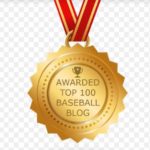 Baseball Roundtable is on the Feedspot list of the Top 100 Baseball Blogs. To see the full list, click here.
Baseball Roundtable is on the Feedspot list of the Top 100 Baseball Blogs. To see the full list, click here.
I tweet baseball @DavidBBRT
Follow/Like Baseball Roundtable’s Facebook Page here. More baseball commentary; blog post notifications; PRIZES.
Member: Society for American Baseball Research (SABR); The Baseball Reliquary; The Negro Leagues Baseball Museum.
